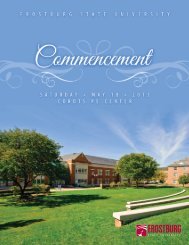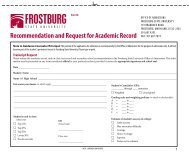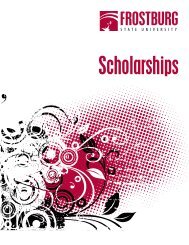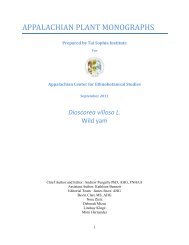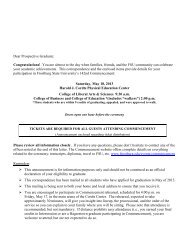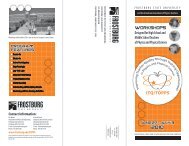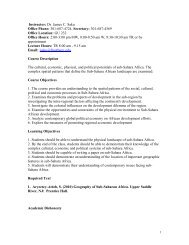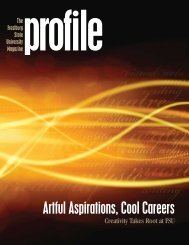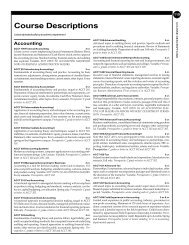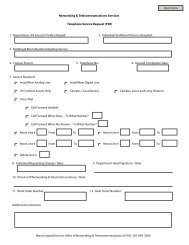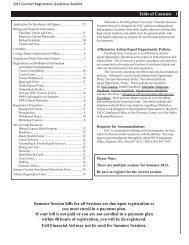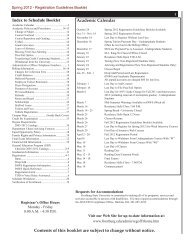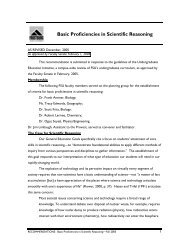Spring 2012 - Frostburg State University
Spring 2012 - Frostburg State University
Spring 2012 - Frostburg State University
You also want an ePaper? Increase the reach of your titles
YUMPU automatically turns print PDFs into web optimized ePapers that Google loves.
22<br />
Ethnobotany Links<br />
Personal Wellness With<br />
Environmental Health<br />
By Becca Ramspott<br />
“Just like my grandma used to make.” It’s a phrase some of us might<br />
use to describe homemade chicken soup or spaghetti. But in Mimi<br />
Hernandez’s case, it might mean garlic cloves soaked in honey to<br />
stave off a cold, or dandelion greens to stimulate digestion.<br />
Hernandez, FSU’s coordinator for the<br />
Appalachian Center for Ethnobotanical<br />
Studies and a clinical herbalist with the<br />
Council of American Herbalists Guild,<br />
first learned about herbal remedies from her<br />
grandmothers in Colombia and Mexico. Today,<br />
she shares her knowledge with FSU students<br />
in classes like “Introduction to Ethnobotany,”<br />
where they discuss the importance of eating<br />
locally grown and whole foods and how cultural<br />
transitions have led to changes in societal food<br />
options.<br />
“I think it really opens their eyes. A lot of<br />
times they come in as college students and<br />
they’re very much in the culture of visiting fast<br />
food restaurants and not questioning their food<br />
choices,” Hernandez said. “A lot of them are still<br />
young and haven’t realized the consequences of<br />
what they eat.”<br />
Hernandez’s classes might examine how shifting<br />
an indigenous culture’s traditional diet to a<br />
diet with more processed sugar has caused an<br />
increase in diabetes cases. They also study local<br />
herbs in the Appalachian area, like wild ramps<br />
and blueberries, and learn the value of eating<br />
and harvesting local plants for good health. One<br />
of those local plants is a weed called plantain<br />
that grows all over the FSU campus. Hernandez<br />
calls it “the herbal Band-Aid,” and says it can<br />
be used to treat mosquito bites and other skin<br />
conditions.<br />
In addition to her FSU classes, Hernandez<br />
has helped organize community events like a<br />
local celebration of Food Day, which encourages<br />
Americans to make healthier choices about<br />
plantain<br />
the foods they eat. She occasionally offers educational<br />
workshops to local residents through<br />
<strong>Frostburg</strong>’s Mountain City Traditional Arts,<br />
including community herbalist certification,<br />
which teaches participants how to identify popular<br />
plants in the area and lets them make simple<br />
folk remedies to take home.<br />
“Part of the outreach effort is reconnecting<br />
people with their local resources and their traditions,<br />
and just having an appreciation for their<br />
own culture,” Hernandez said. “In some cases, it<br />
makes people want to reflect back to their childhoods<br />
and remember their grandparents’ homemade<br />
remedies. It inspires people to look back<br />
at their own lineage and make connections with<br />
their own roots.”<br />
Dr. Sunshine Brosi, an assistant professor<br />
of biology who heads up FSU’s ethnobotany<br />
program, is also interested in helping people –<br />
particularly young people – get in touch with<br />
their roots. Last year, she and FSU students<br />
in her “Economic Botany” class built a raised<br />
garden bed at the <strong>University</strong> Children’s Center.<br />
They planted vegetables so children could have<br />
hands-on interaction with the environment and<br />
harvest fresh produce. Brosi and her students<br />
have completed similar service learning projects<br />
at The Maryland Salem Children’s Trust, Inc., in<br />
Garrett County, which provides a home, therapy<br />
and educational services to children who have<br />
been abused or neglected, or have educational or<br />
behavior needs.<br />
“Kids are more likely to eat tomatoes if they<br />
plant the seed and watch it grow,” Brosi said.<br />
“They’ve gone through the whole process of<br />
seeing a flower become a fruit. They learn to<br />
understand the importance of taking care of the<br />
soil. … They also see that relationship between<br />
their food, their environment and healthy food<br />
choices.”<br />
In addition to helping her students get out<br />
of the classroom through service learning, Brosi<br />
also does research on forest populations of black<br />
Geography professor Dr. Craig Caupp shows his organic<br />
garden to Hernandez’s ethnobotany class.<br />
cohosh, an herb that is native to the Western<br />
Maryland region and can treat menopausal<br />
symptoms like hot flashes and mood swings,<br />
a natural alternative to hormone therapy. In<br />
addition to studying its uses, she’s especially<br />
interested in making sure black cohosh isn’t<br />
overharvested.<br />
“I want to show the connection between<br />
personal health and environmental health, that<br />
connection between biological diversity, ecological<br />
health and richness of cultures,” she said. “I<br />
spend a lot of time talking to my students about<br />
how a lot of our natural environment is humandominated,<br />
through agriculture and managed<br />
landscapes. … One of the main things I try to<br />
get them to think about is how we can most<br />
effectively manage areas to provide clean air,<br />
clean water and food and medicinal herbs without<br />
jeopardizing biodiversity.”<br />
It’s all part of making science subjects like<br />
biology more relevant to students’ daily lives,<br />
too.<br />
“It’s easier to teach biology when students see<br />
a personal connection and when they’re going<br />
through that process of activities,” Brosi said.<br />
“Ethnobotany builds on your personal connection<br />
to biology.” <br />
Inspired by Class, Student Embarks on Local, Eco-Friendly<br />
Eating Experiment<br />
This past fall, FSU student Carl Koch was so inspired by what he learned in his FSU geography<br />
class, he not only took the ideas to heart, but to his stomach as well.<br />
“I’ve always been interested in food systems, at least on the consumption end of the process,” Koch<br />
said. “I wanted to learn more about how my food was produced.”<br />
Food systems – the set of networks and relationships found in the production, distribution and consumption<br />
of food, also known as “from farm to fork” – are the subject of FSU’s GEOG 360 class.<br />
“The course covers many topics but one learning objective is to have students understand that our<br />
answers to ‘What’s for breakfast or lunch or dinner?’ are not only decisions about taste and convenience,<br />
but also actions with health, ethical and environmental consequences,” said Dr. Richard Russo, an<br />
assistant professor of geography who created the class and offered it for the first time last fall.<br />
Koch, a junior majoring in geography and Navy veteran who lives on a Garrett County farm, decided<br />
to try to feed his family local, eco-friendly foods and eat locally throughout the fall 2011 semester,<br />
as part of his learning experience in GEOG 360. He and his wife began replacing processed foods and<br />
meats with fresh fruits and vegetables grown close to home. They also purchased ducks and replaced<br />
store-bought chicken eggs with duck eggs. There were quite a few challenges, like what Koch<br />
describes as “the complete lack of restaurants that source their foods locally,” along with<br />
the increased time needed for food preparation. But that just led him to turn cooking<br />
into a reason to spend more time with his family and get them involved.<br />
“One of the immediate benefits of eating local eco-friendly foods is the peace of<br />
mind in knowing that the substances that are providing our bodies nourishment and<br />
keeping us alive were produced in a manner that will not inevitably cause the demise<br />
of our species,” Koch said. “Also, in just a few weeks, we had a lot more energy and felt<br />
healthier, too. After eating this way for a few months, we could not imagine ever being<br />
able to fully revert to our old laissez faire, buy-one-get-one, all-you-can-eat, individually<br />
wrapped American diet.”<br />
Koch shared updates on his eating adventures with Russo throughout<br />
the semester and is now considering sharing his experiences in a presentation<br />
for FSU’s annual Focus <strong>Frostburg</strong>, a day-long campus event<br />
coinciding with Earth Week that includes workshops and talks on<br />
sustainability issues.<br />
“I’m interested in a career in environmental management and<br />
sustainability,” he said.<br />
Carl Koch <br />
23




